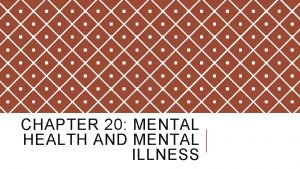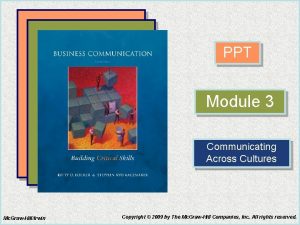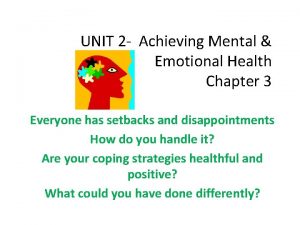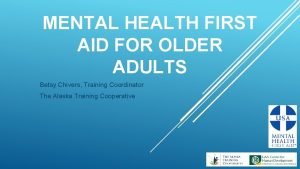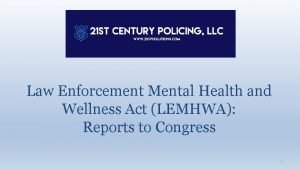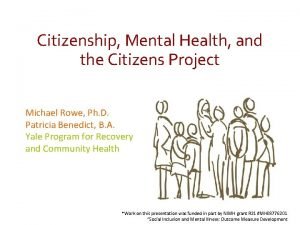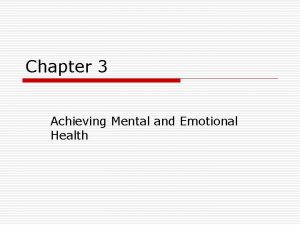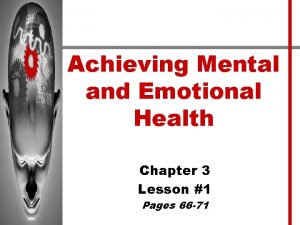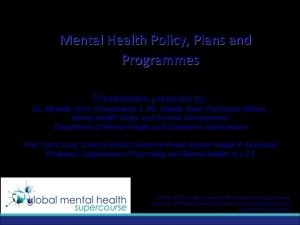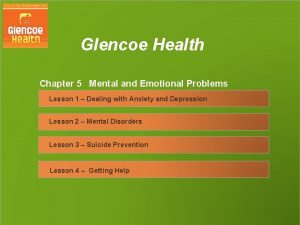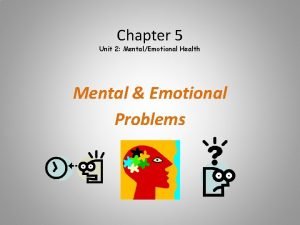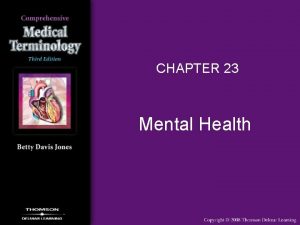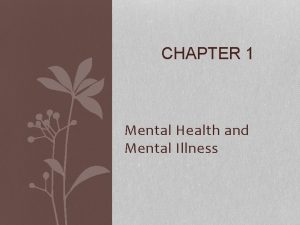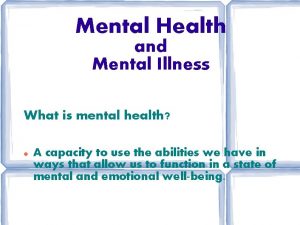RELATIONSHIPS IN THE CONTEXT OF MENTAL HEALTH AND


















- Slides: 18

RELATIONSHIPS IN THE CONTEXT OF MENTAL HEALTH AND MENTAL CAPACITY LAW: PERSPECTIVES FROM NORTHERN IRELAND Gavin Davidson, Professor of Social Care Praxis Chair of Social Care, Queen’s University Belfast g. davidson@qub. ac. uk www. qub. ac. uk/cesi

Overview of the presentation • Northern Ireland context • The importance of relationships in mental health and learning disability practice • Some relatively neglected aspects of those relationships – compulsory intervention, trauma and deprivation • Mental Capacity Act (Northern Ireland) 2016 • Relatively neglected relationships www. qub. ac. uk/cesi

Main themes • Relationships between service users and social workers are just as important, if not even more so, in the context of compulsory intervention • Sometimes the focus on compulsion may contribute to the neglect of other crucial factors such as trauma and deprivation • Social work often leads in the complex grey areas involved in coercion and engages with the associated issues • If someone has the relevant decision making ability, regardless of whether they have any form of mental health problem and/or learning disability that decision should be respected (unless it’s criminal and then should be addressed through that system) • Mental health law based on the criteria of mental disorder and risk is discriminatory and a functional capacity based framework for all should be in place www. qub. ac. uk/cesi

Perspectives from Northern Ireland Assembly suspended in January 2017 www. qub. ac. uk/cesi

Relationships in mental health and learning disability practice • Ongoing debate about the relative importance of general (relationship-based) and specific (therapeutic approach) factors • Saul Rosenzweig’s (1936) hypothesis “Some implicit common factors in diverse methods of psychotherapy” Dodo Bird verdict • Used the concept from Alice in Wonderland – the Dodo Bird’s conclusion about who had won a race: “everybody has won, so all must have prizes” • Luborsky et al. (2002) reviewed 17 meta-analyses of comparisons of active treatments concluded they tend to have small and nonsignificant differences • The overlap in approaches, the helping relationship, the opportunity to express one’s thoughts and the gains in self-understanding www. qub. ac. uk/cesi

Relationships in compulsory intervention under mental health and mental capacity law • Concept of procedural justice • Components are: when a person, who may be subject to compulsory intervention, perceives that the decisionmaking processes are fair and just; that they are actively included in the processes; and that professionals or authorities involved exhibit personal qualities that are congruent with the intent of the processes (Mc. Kenna et al. , 2001) • “According clients procedural justice by allowing them voice in their treatment and legal proceedings, treating them with respect, and conducting transparent procedures appears to ameliorate the perception of coercion in a significant percentage of clients who are subject to mandated treatment. ” (Galon and Wineman, 2010: 314) www. qub. ac. uk/cesi

Relationships in compulsory intervention under mental health and mental capacity law • Relevance of trauma – over-representation • Association between childhood trauma and psychosis • 59 studies - weighted averages, accounting for variation in sample size, show that 64. 5% of the women, and 55. 5% of the men, had been subjected to either Child Sexual Abuse or Child Physical Abuse. The combined rate is 60. 2%. (Read et al. , 2008) • “How many studies will it take before all mental health service users, including those experiencing psychosis, are asked not just what ‘symptoms’ they have but what happened to them in childhood and since? (Read, 2014, p. 477) - How much evidence is required for a paradigm shift in mental health? www. qub. ac. uk/cesi

Relationships in compulsory intervention under mental health and mental capacity law • Relevance of trauma • Political conflict 1968 -1998, over 3, 500 deaths and 50, 000 injured, ongoing issues • Prevalence of mental health problems is high in Northern Ireland - with an estimated 23. 1 % of the population meeting the criteria for any DSM-IV 12 -month disorder (second highest in the World Mental Health Survey (20042008) the United States - 26. 2 %) (Bunting et al. , 2013) • Anti-depressants prescribed twice as much in NI as in England (Royal College of Psychiatrists, 2010) • Prevalence of PTSD estimated to be 5. 1% (12 month) and 8. 8% (lifetime) – highest of the 27 countries in the WMH survey (Ferry et al. , 2014) www. qub. ac. uk/cesi

Relationships in compulsory intervention under mental health and mental capacity law • Relevance of trauma • Berry et al. (2013) reviewed 24 studies, published between 1980 and 2011. Reported that studies showed high levels of PTSD resulting from the trauma of symptoms and/or hospitalisation, with prevalence rates for actual PTSD resulting from these traumas varying from 11% to 67% • Potential impact of compulsory intervention on sense of self, relationships with others, engagement with services, issues of stigma, internalised stigma, discrimination and anticipated discrimination • At times, responding to trauma with trauma? www. qub. ac. uk/cesi

Relationships in compulsory intervention under mental health and mental capacity law • Relevance of deprivation • Deprivation - social determinants, social gradient (Black, 1980; Acheson, 1998, Marmot, 2005) – material stressor • Inequality – greater inequality associated with higher rates of mental health problems, particularly depression and anxiety (Ribeiro et al. , 2017; Wilkinson and Pickett, 2017) – social stressor • Not routinely even recorded, in a standardised way, in mental health and learning disability services • Audit of assessments under the Mental Health (NI) order 1986 • 189 assessments - 1 st August 2015 until the 31 st October 2015 • Used person’s postcode and Northern Ireland Multiple Deprivation Measure – social gradient www. qub. ac. uk/cesi

Relationships in compulsory intervention under mental health and mental capacity law • Relevance of deprivation • Child Welfare Inequalities Project (led by Professor Paul Bywaters) (Mc. Cartan et al. , 2018) • Anti-poverty practice framework for social work in Northern Ireland (led by Aine Morrison, Office of Social Services) www. qub. ac. uk/cesi

Mental Capacity Act (Northern Ireland) 2016 • Another issue which is relevant to positive relationships in mental health and learning disability practice is the legal framework • Current legal framework: Mental Health (NI) Order 1986 (criteria of mental disorder and risk) – possible to be detained with the relevant decision making ability; possible to be voluntary without the relevant decision making ability • No current statute law to enable health and welfare decisions to be made for people who lack the capacity to do so – reliance on common law principles of necessity, reasonable belief and best interests – High Court if necessary • ECHR/Human Rights Act Judgements – Bournewood - HL vs UK (2004) • Developments in the laws of our neighbouring jurisdictions • Dawson and Szmukler (2006) Fusion approach • UNCRPD (2006) supported decision making www. qub. ac. uk/cesi • Bamford Review (2002 -2007)

Mental Capacity Act (Northern Ireland) 2016 • Bamford Review of Mental Health and Learning Disability (2007) A Comprehensive Legislative Framework • “The Review considers that having one law for decisions about physical illness and another for mental illness is anomalous, confusing and unjust…the Review considers that Northern Ireland should take steps to avoid the discrimination, confusion and gaps created by separately devising two separate statutory approaches, but should rather look to creating a comprehensive legislative framework which would be truly principles-based and non-discriminatory. ” • Passed by the NI Assembly and received Royal Assent on 9 th May 2016 • Draft Code of Practice – consultation with Reference Group September 2017 and formal consultation 2019 • Implementation planned for 2020/21 www. qub. ac. uk/cesi

Mental Capacity Act (Northern Ireland) 2016 www. qub. ac. uk/cesi

Intended benefits and potential complexities • Responds to requirements of ECHR and UNCRPD • Provides better safeguards for those whose decision making ability may be impaired • Addresses discrimination based on mental disorder and the uncertainties of predicting harm • May be subject to legal challenges • Possible widening of compulsion • Could divert resources from other services • Support principle central • Important need for research www. qub. ac. uk/cesi

Relatively neglected relationships • Central importance of selfcare and relationships with family and friends, and interventions to support them • 110 long-stay (average 17 yrs) patients perspectives on the most important things in their lives - family • Relative neglect in mental health and learning disability practice of interventions to actively support people to form and maintain relationships (Hollomotz, 2011, Webber et al. , 2010) www. qub. ac. uk/cesi

Conclusion • The importance of relationships is part of evidence based practice • The focus on relationships shouldn’t neglect the context of those relationships – trauma and deprivation • The current legal framework for when compulsion is needed in the relationship between service user and state discriminates against those with mental health problems and learning disabilities • Mental Capacity Act (Northern Ireland) 2016 provides a nondiscriminatory framework • It is what you and the way that you do it www. qub. ac. uk/cesi

References and links • Mental Capacity Act (Northern Ireland) Act 2016 - http: //www. legislation. gov. uk/nia/2016/18/contents/enacted • Anti-Poverty Practice Framework for Social Work in NI - https: //www. health-ni. gov. uk/publications/doh-antipoverty-framework • Berry, K. , Ford, S. , Jellicoe-Jones, L. , & Haddock, G. (2013). PTSD symptoms associated with the experiences of psychosis and hospitalisation: A review of the literature. Clinical Psychology Review, 33(4), 526 -538. • Bunting, B. , Murphy, S. , O’Neill, S. and Ferry, F. (2013) Prevalence and treatment of 12 -month DSM-IV disorders in the Northern Ireland study of health and stress. Soc Psychiatry Psychiatr Epidemiol (2013) 48: 81– 93 • Ferry, F. , Bunting, B. , Murphy, S. , O’Neill, S. , Stein, D. , & Koenen, K. (2014). Traumatic events and their relative PTSD burden in Northern Ireland: a consideration of the impact of the ‘Troubles’. Social psychiatry and psychiatric epidemiology, 49(3), 435 -446. • Galon, P. A. , & Wineman, N. M. (2010). Coercion and procedural justice in psychiatric care: State of the science and implications for nursing. Archives of Psychiatric Nursing, 24(5), 307 -316. • Hollomotz, A. (2011). Learning difficulties and sexual vulnerability: A social approach. Jessica Kingsley Publishers. • Mc. Cartan, C. , Bunting, L. , Bywaters, P. , Davidson, G. , Elliott, M. , & Hooper, J. (2018). A four-nation comparison of kinship care in the UK: the relationship between formal kinship care and deprivation. Social Policy and Society, 17(4), 619 -635. • Mc. Kenna, B. G. , Simpson, A. I. , Coverdale, J. H. , & Laidlaw, T. M. (2001). An analysis of procedural justice during psychiatric hospital admission. International journal of law and psychiatry, 24(6), 573. • Luborsky, L. , Rosenthal, R. , Diguer, L. , Andrusyna, T. P. , Berman, J. S. , Levitt, J. T. , Seligman, D. A. & Krause, E. D. (2002). The dodo bird verdict is alive and well—mostly. Clinical Psychology: Science and Practice, 9(1), 2 -12. • Read, J. , Dillon, J. , & Lampshire, D. (2014). How much evidence is required for a paradigm shift in mental health? . Acta Psychiatrica Scandinavica, 129(6), 477 -478. • Read, J. , Fink, P. , Rudegeair, T. , Felitti, V. , & Whitfield, C. (2008). Child maltreatment and psychosis: a return to a genuinely integrated bio-psycho-social model. Clinical Schizophrenia & Related Psychoses, 2(3), 235 -254. www. qub. ac. uk/cesi • Webber, M. , Ansari, D. , & Reidy, H. (2010). Connecting People Intervention. London: King’s College London Institute of Psychiatry.
 Chapter 20 mental health and mental illness
Chapter 20 mental health and mental illness Mental illness mental health jeopardy
Mental illness mental health jeopardy Physical context and linguistic context
Physical context and linguistic context High context vs low context culture ppt
High context vs low context culture ppt Communicating across generational differences
Communicating across generational differences Verbal adalah
Verbal adalah Sexual health and relationships education scotland
Sexual health and relationships education scotland The intentional use of unfriendly or offensive behavior
The intentional use of unfriendly or offensive behavior Mental health and older adults
Mental health and older adults Law enforcement mental health and wellness act
Law enforcement mental health and wellness act Mental health and older adults
Mental health and older adults Mental health and citizenship
Mental health and citizenship Chapter 3 achieving mental and emotional health
Chapter 3 achieving mental and emotional health Chapter 21 mental health diseases and disorders
Chapter 21 mental health diseases and disorders Chapter 3 lesson 2 health
Chapter 3 lesson 2 health Psychology, mental health and distress
Psychology, mental health and distress Mental health policy, plans and programmes michelle funk
Mental health policy, plans and programmes michelle funk Glencoe health chapter 5 mental and emotional problems
Glencoe health chapter 5 mental and emotional problems Chapter 5 lesson 4 mental and emotional problems
Chapter 5 lesson 4 mental and emotional problems
